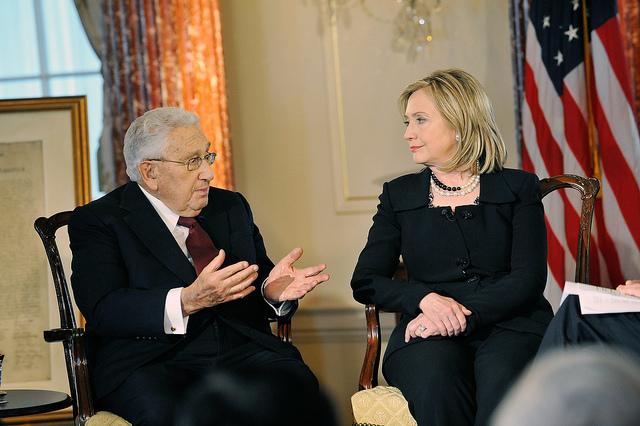Asia, not Atlantic, for Hillary
Posted By Graeme Dobell on June 23, 2014 @ 06:00
[1]A part of being a foreign-affairs tragic is believing any memoir by a modern US Secretary of State is interesting, no matter how flawed the book or the Secretary.
This tragic ranks the autobiographies of Acheson and Kissinger as golden, while Alexander Haig represents the more leaden category.
Even Haig, though, is fascinating, not least for his shocked lament that elite Washington players leak continuously to the press and—gasp!—are constant plotters. Coming from a Kissinger apprentice in Richard Nixon’s court, this is gorgeous, showing that even a leaden Secretary of State auto-effort is illuminating.
In this field, Hillary Clinton’s Hard Choices [2] rates a comfortable silver; Hillary will never be shocked about the darkness or perfidy of Washington. As she remarks after trespassing on Treasury’s domain, ‘turf [is], of course, … a precious Washington commodity’. The way Clinton defines important turf beyond Washington gives her memoir a shape and taste distinctly different from many of her predecessors’ books. This is a 21st century memoir, largely free of Cold War baggage.
For Asia, Hillary’s silver-medal effort is gold. Hillary departs from the entrenched Atlanticism of the usual Secretary of State memoir. As in much else, Acheson set the standard. And as the 20th century Metternich, Kissinger’s frame is inherently European, despite all the wordage he devoted to China and the Vietnam War.
Clinton’s account plunges into Asia. The Asia flavour can be highlighted by comparing Hillary’s effort to that of Madeleine Albright, the most Clintonist of Bill Clinton’s Secretary of States. Albright’s memoir also rates in the silver category, sitting roughly beside Hillary. The difference is that Albright writes in the Atlanticist tradition so wonderfully exemplified by Acheson in Present at the Creation.
Clinton nods to that history, even detailing her first meeting with Acheson—’the embodiment of an imposing, old-school diplomat’—at Wellesley in 1969, the night before Ms Hillary Rodham first introduced herself to America with a tradition-busting graduation speech [3].
Clinton invoked Acheson as she took up her job at Foggy Bottom: ‘After I became Secretary of State, I often thought of the grey-haired elder statesman I met that night at Wellesley. Beneath his formal exterior, he was a highly imaginative diplomat, breaking protocol when he thought it was best for his country and his President’.
Clinton’s break with Atlanticist protocol comes across even in the structure of the book. Part One contains two sharp chapters on reconciling with Obama (Team of Rivals) and taking the Secretary’s job, built around the idea of enhancing US ‘smart power’. Part Two heads straight across the Pacific to the great conundrum of China and the excitement of Burma’s turn to the light.
Part Three covers War and Peace in Afghanistan and Pakistan. Part Four is the catch all, with one chapter each for Europe, Russia, Latin America and Africa. Part Five outlines the chaos of the Middle East under the heading, ‘Upheaval’. Part Six turns to the next presidential election, covering jobs, the economy and the future.
The way Clinton abandons the Atlanticist tradition of Secretary of State memoirs is camouflaged by the caution that touches every page. Clinton doesn’t write as well as Acheson or Kissinger, nor even offer the summing-up judgements of Albright. Of course, she can’t. She’s a consummate professional politician, ever conscious of the history she’s yet to make.
The Asia flavour in the opening parts of Hillary’s memoir are the last thing America is going to notice. Her account of US foreign policy must serve multiple political purposes, raising the defences against Republican deceit and damnation, while emphasising Hillary’s Democratic credentials. Not the least complicated dance involves Clinton’s constant emphasis on how close she grew to Obama, while touching on slight differences that might become extremely useful in the next presidential campaign. Behold the memoir of a politician who wants to be many things in two years time—Obama’s heir, the second Clinton president and the US’ first woman president.
Washington’s understanding of the world must be on the move if such a cautious book can so break with Secretary of State tradition. But Washington shifts slowly. On the evidence of Clinton’s memoir, if she were still Secretary of State, the President wouldn’t have given a major foreign policy speech at West Point that failed to mention the pivot.
And Hillary is quite emphatic about calling it a pivot and describing what it means for Asia and for China. More on Hillary and the pivot in the next column.
Graeme Dobell is the ASPI journalist fellow. Image courtesy of Flickr user U.S. Department of State [4].
Article printed from The Strategist: https://aspistrategist.ru
URL to article: /asia-not-atlantic-for-hillary/
URLs in this post:
[1] Image: https://aspistrategist.ru/wp-content/uploads/2014/06/Clinton-and-Kissinger.jpg
[2] Hillary Clinton’s Hard Choices: http://www.amazon.com/Hard-Choices-Hillary-Rodham-Clinton/dp/1476751447
[3] tradition-busting graduation speech: http://www.wellesley.edu/events/commencement/archives/1969commencement/studentspeech
[4] U.S. Department of State: https://www.flickr.com/photos/statephotos/5639317952
Click here to print.
